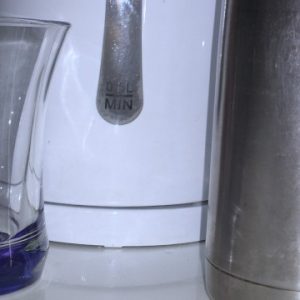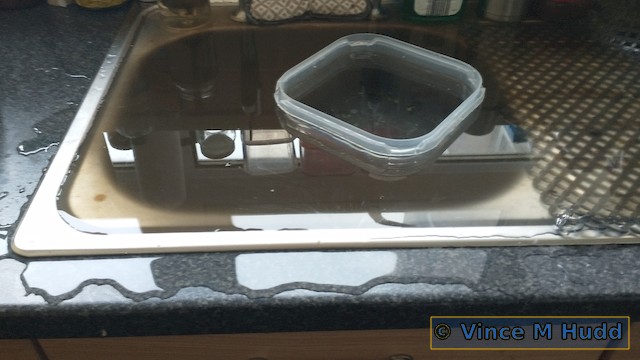There’s a silly little thing I do, more out of a form of laziness than anything else, but which I realised recently may actually be saving me a small amount of electricity, and therefore money – and thinking about it, I realised could probably save even more (though still not a huge amount).
I’ll start with the tip itself, and you can then read my rambling explanation after. There are three basic points:
- When making a cup of coffee (other hot drink options are available) pour any excess water from the kettle into a flask.
- If you make any more cups of coffee (or one of those other options) while the water remains hot enough, use the water from the flask rather than boiling more.
- If you make another cup and the water in the flask is no longer hot enough, pour that back into the kettle, topping it up from your tap if necessary, to boil again.
Whether or not it will save you money will depend on a number of factors, such as:
- Do you live alone? This is likely to be where the biggest saving is, because you’re making the least amount of coffee (or tea, or any other drink for which you boil water) versus the amount of water you boil.
- If not, how often do you make a coffee (or whatever else you might choose to punish yourself with if you don’t like the heaven that is coffee) for yourself and nobody else? If you (and others in your household) frequently make single cups, there should be a small saving here for the same reason.
- What is the minimum amount of water you need to use in your kettle vs how big (or small) are your mugs (or cups)? If you use mugs, you’re using more of the water you boil in one go. If you use something smaller, you’re using less. The less of the boiled water you use, the more of a potential saving there is.
And it should go without saying, but I’ll add it anyway: The more frequently you make coffee (other hot drinks are available, but there’s no accounting for taste) the more of a saving this could represent.
If you’ve paid attention to general advice over the last ‘n’ years, you’ll probably know that it’s already recommended to not boil any more water than is absolutely necessary – for precisely the reason of saving electricity when boiling the kettle; the less water it contains, the less electricity is needed to bring it to the boil. If you boil more than you need, you’re using more electricity than you need to use, and therefore paying more money for that electricity than you need to pay.
However, the chances are that the minimum amount you can boil in your kettle is notably more than the amount you can get in a cup, and if so you’re boiling more than a cupful of water whenever you want a cup of coffee (I’m not going to bother mentioning other options any more. Why would you even do that to yourself?)
Therefore, the logic of point 2 above is that if you want more coffee, depending how long after the first it is, any water in the kettle could have cooled sufficiently that it would need to be boiled again (after topping it up so that it’s at the minimum amount). If that water was put in a flask and remains hot enough, you can just use it without boiling it again. That’s a small amount of electricity not being used at all for the subsequent coffee.
This was, for me, originally just a way to be lazy and/or save a little time. I wasn’t doing it to save electricity, but simply so that I didn’t have to wait for the kettle. As such I didn’t do it consistently, but generally speaking if I made a cup of coffee and expected to want more in a short-ish space of time, I’d pour that ‘spare’ boiled water into a flask for use in the next cup.
In my case, the kettle’s minimum is half a litre of water, which is enough for almost three cups of coffee. So every time I want a cup of coffee, I’m boiling almost three times the amount of water that I need – but by boiling a little over the minimum, a little over half a litre, I can make a cup of coffee now, and keep enough in the flask for another two cups, with no further electricity used to make them.

Because I was doing it to save time, I wasn’t thinking about the electricity aspect of it at all. At least not until recently, when the penny dropped – and not in the direction of my electricity provider!
When I realised, though, I thought ‘I should point that out to people‘ and made a mental note to write a blog post about it. More recently (a few days before explaining why I’ve not posted much lately) that note became an electronic one – and at that point I realised that extending what I did a little further would save a little more. Point 3 above.
The logic there is that when boiling the water again, it’s starting from a higher temperature than if that water had just been left in the kettle. It’s being cooled slightly by adding more from the tap if (as will generally be the case for me), but overall it’s still a higher starting temperature.
A higher starting temperature means it’ll take less electricity to bring it to the boil.
Since realising, I’ve changed my habit completely – as I said, I was occasionally putting the unused boiled water in a flask, if I was anticipating having more coffee soon-ish. Now, however, I do it every time I make a cup of coffee. And next time I boil the kettle, I pour in whatever’s left in the flask first, then top up from the tap.
I don’t know exactly how much I’m saving because I’ve also changed a few other things, and on top of that my work situation means I’m out of the flat a little more frequently than I have been for the last nine months or so, which means a reduction in the amount I use anyway. Also, I’ve mentioned elsewhere (and in this post) that I’m on a fixed price contract that’s a long way below the amount most people are currently paying. That means any saving for me would be greater for anyone in similar circumstances but without the cheap fix, simply because their electricity costs more.
But if there’s nothing at all being saved by using less electricity to boil water that’s still hot from the last time it was boiled (or even just warm, depending on how long after), and especially by not boiling it at all if the water in the flask is hot enough… then some bugger’s been rewriting the laws of physics.




